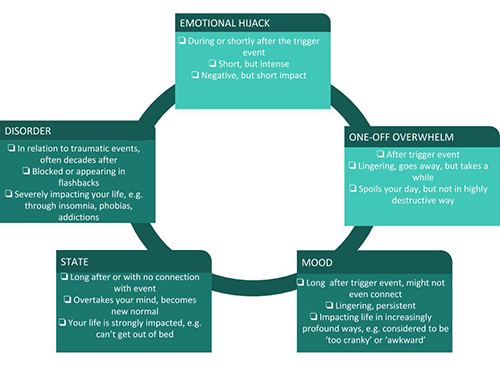5 Stages of Emotional Turmoil and How to Know When to Seek Help
My friend recently got caught up in a difficult situation at work. He is accused of something he didn’t do, but he can’t do anything about it because the matter is sensitive, with potential legal ramifications. The sense of unease and unfairness is overwhelming and combined with feeling helpless to change the situation, he is feeling truly down. He received little support from his superiors organization which, combined with putting up with long hours and never-ending stress, leads him to decide to find another job.
The decision is made, so he should be all relieved, right?
Not so fast.
He struggles to get up to work every day.
He is more stressed, upset, irritable. His decisions are impacted, his motivation is non-existent and he is angry about being treated unfairly.
His personal life is impacted too. After taking a week off, he realizes his hands are shaking before opening work emails. Instead of enjoying Sunday with his girlfriend, he gets all worked up the closer it is to Monday.
Do you think my friend will seek support from a professional?
Unlikely.
We are likely to not seek out help until we are truly not coping and often are left to our own devices how to deal with such emotional turmoil. Many of us wait until we work ourselves to such a state we are nearly dysfunctional before we seek help.
Learning to capture that moment when your emotions and overwhelm starts negatively impacting your life is a crucial skill if you want to manage your emotions and ensure your adequate responses.
This can be achieved by asking yourself 3 questions.
1. How long after the trigger event you are experiencing emotional turmoil?
If it is immediately after, without lingering, there should be no harm in that, but if you feel guilty about something days or months after — this is not a healthy situation.
Sometimes it can be hard to capture the trigger event as it could be a long time ago or you might have misplaced your emotions and are looking at the wrong event.
2. How does your emotional feel in terms of temperature (high/low) and pleasantness?
Checking your emotions in the temperature and pleasantness will help you better understand what is going on. As you might be aware, labeling emotions help to reduce the intensity almost immediately, and analyzing the emotion helps understand better its impacts.
3. Is my life being negatively impacted?
If you just like my friend finds yourself physically and mentally impacted, this potentially means you already crossed to the unhealthy realm of emotional overwhelm.
If you analyze the situation in regards to those 3 aspects, it becomes very quickly clear whether it is something you can deal with yourself or the best thing to do is to seek out help. When I was stuck in one of my depressive moods, I reached out to my doctor and we discussed my options in-depth and it was the best prevention and the best way to look after myself.
The longer you are feeling emotions after the trigger event, the more intense and unpleasant they are the more negative impact you will experience.
This could be not just Sunday with your partner ruined, but increased insomnia, feeling down and less energetic, etc.
Realistically, you should only attempt to deal with light green stages on your own — everything else needs professional guidance.

